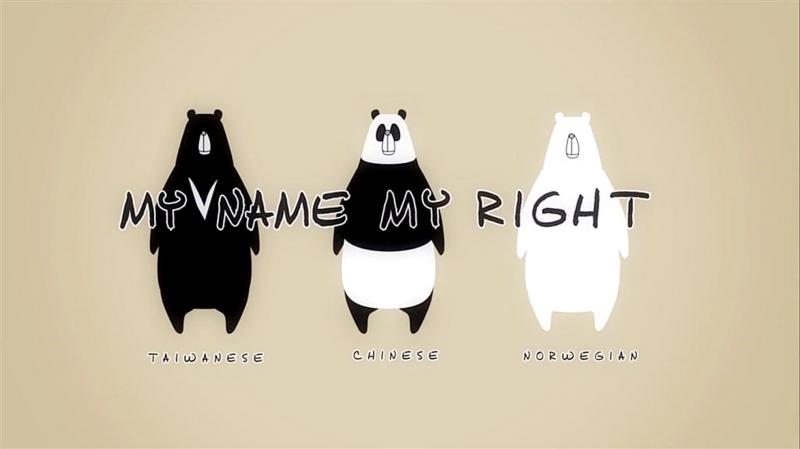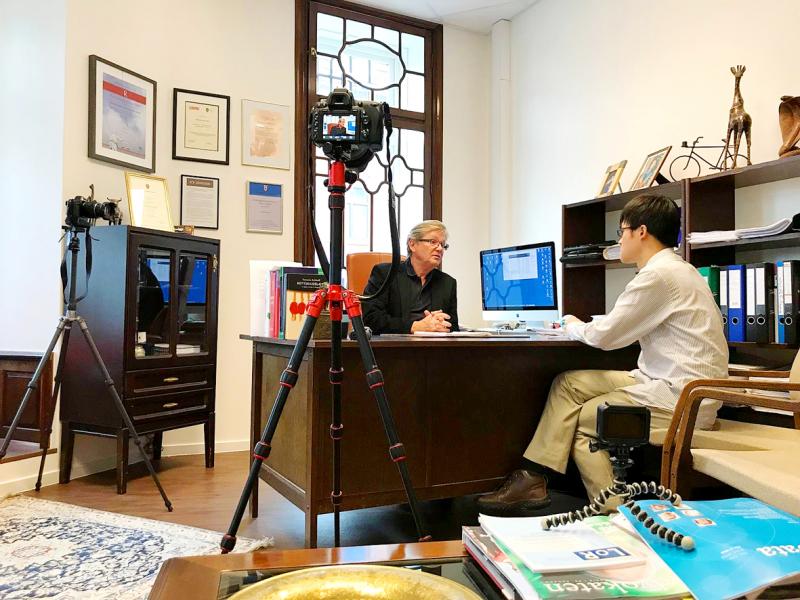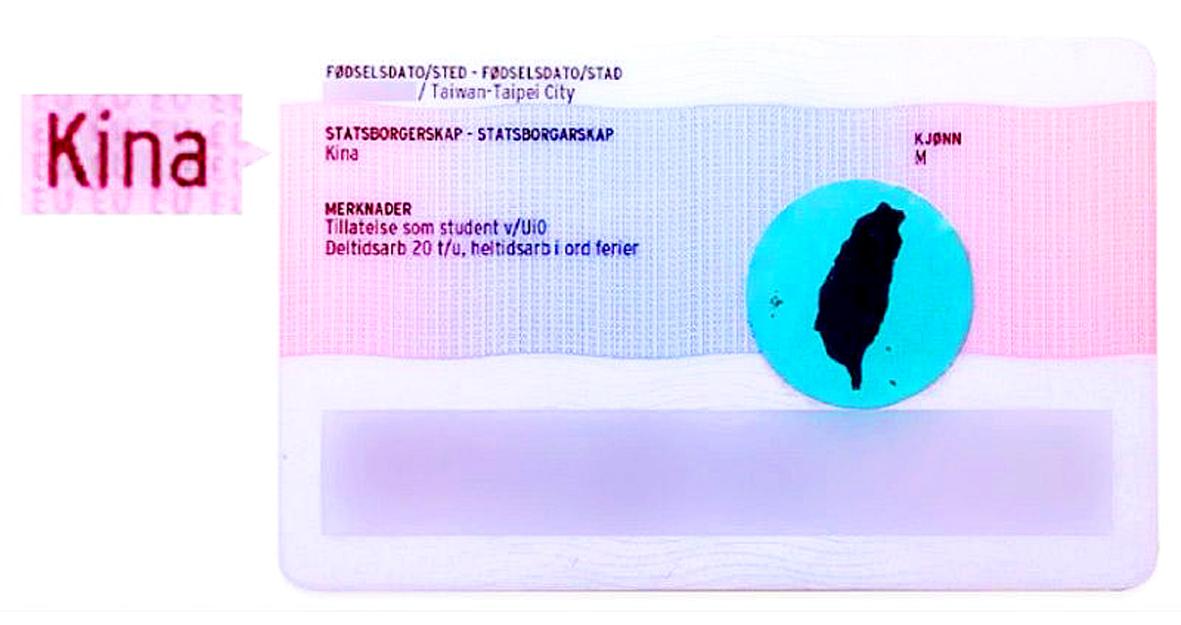Joseph Liu chose Norway for his legal studies because he wanted to learn more about human rights. But instead, he’s been fighting the Norwegian government for the past four years for the right to use his national identity.
Following a diplomatic row with China in 2010, Norway changed the nationality of its Taiwanese residents to “Chinese.” Liu and others launched the My Name, My Right movement to raise funds and pressure the authorities to change the country designation back to Taiwan. They eventually took the case to the Norwegian supreme court, where they lost in November last year.
While the outcome wasn’t surprising, “we didn’t even have a chance to represent ourselves in court,” Liu says. “The judge just rejected us on grounds that our allegations were unfounded. I’m quite disappointed in Norway’s legal system.”

Photo courtesy of My Name, My Right
Liu and his team filed a lawsuit last month with the European Court of Human Rights (ECHR) in France, where they now have to wait up to a year to see if the case is accepted due to the court’s enormous caseload. As of the end of April, there were about 65,000 pending cases.
If the ECHR rejects the lawsuit, Liu plans to either help Taiwanese in other countries who have similar issues, or bring the issue to the UN.
“It doesn’t matter if we win or not, but we need to keep speaking out,” he says. “If we remain silent, then it will become difficult in the future for Taiwanese to exercise their right to self-determination. Not saying anything means that we’ve quietly accepted the fact of being designated as Chinese.”

Photo courtesy of My Name, My Right
“If this lawsuit wins, it would be the first time for the European Court of Human Rights to make a decision related to national identity,” states a My Name, My Right press release. Since the ECHR is binding on the 47 member states that have signed the European Convention on Human Rights, it means that these countries could no longer register Taiwanese citizens as “Chinese.”
FALTERING TIES
Tensions between Norway and China rose in early 2010 after late Chinese democracy activist Liu Xiaobo (劉曉波) was nominated for the Nobel Peace Prize. Shortly after that, Taiwanese in Norway were forced to identify as “Chinese” to demonstrate the government’s adherence to the one-China principle.

Photo courtesy of My Name, My Right
Taiwan currently has no representative office in Norway — it ceased to operate in 2017 and now all matters go through the office in Sweden.
“It’s really hard for us to make our voices heard,” Liu says. “There used to be a pro-Taiwan group in the parliament, but no longer. We can rally people, but we’re finding it hard to do the same in politics and push them to support some Taiwan-friendly policies.”
For the ECHR battle, Liu has recruited London-based lawyer Schona Jolly, who is chair of the Bar Human Rights Committee and has written about Chinese human rights issues.
Jill Marshall of the Department of Law and Criminology at Royal Holloway College, University of London, said that how a person’s identity is recorded on official documents is a very important matter. It simplifies the complex question of “who we are” into a few words on a document, which may affect people’s rights.
“The applicants are Taiwanese: failing to state this on their official documentation and instead ascribing them with an incorrect nationality misidentifies them and violates their right to personal identity. It is only just and fair that the ECHR acknowledges the violation that has occurred,” said Marshall, who is also the author of Human Rights Law and Personal Identity.”
RAISING TAIWAN’S PROFILE
Liu and his group launched an online fundraising campaign to support their lawsuits, receiving more than NT$3 million.
However, nothing they tried could get through to the courts. They were told that they had no sufficient grounds to their claim due to state policy toward China, and that the designation “would have no consequences and practical significance to their rights and obligations in Norway.”
There are obvious differences, however, as Taiwanese don’t need a visa to get into Norway while Chinese do. There are also different policies toward the two groups due to the vastly different conditions of their home countries.
“Growing up in Taiwan, it was ingrained in us that Taiwan and China are two different entities. China has been threatening Taiwan on all fronts these days, so registering me as “Chinese” is very offensive,” he says.
But Liu feels that popular sentiment has been changing over, as China expands its influence across the globe. When the Liu Xiaobo Incident broke out in 2010, most of Europe was still trying to cozy up to China for economic gain.
“They cast the Taiwan problem aside then because they wanted to be friends with China,” Liu says. “But people are starting to realize the vast differences in ideology and have become wary [of China] ... Technically, there’s little benefit to being nice to Taiwan. But people’s views of Taiwan have changed, especially with the attention it got during the epidemic. Our differences were emphasized in media reports and more people are aware of the problem now.”
Compared to four years ago, Liu has seen an increase in local Norwegians announcing their support for the lawsuit. This is exactly what Liu wants.
“The lawsuit is important. But even more important is that this is an opportunity for more people to know about Taiwan.”
For more information, visit www.facebook.com/TaiwanMyNameMyRight

Most heroes are remembered for the battles they fought. Taiwan’s Black Bat Squadron is remembered for flying into Chinese airspace 838 times between 1953 and 1967, and for the 148 men whose sacrifice bought the intelligence that kept Taiwan secure. Two-thirds of the squadron died carrying out missions most people wouldn’t learn about for another 40 years. The squadron lost 15 aircraft and 148 crew members over those 14 years, making it the deadliest unit in Taiwan’s military history by casualty rate. They flew at night, often at low altitudes, straight into some of the most heavily defended airspace in Asia.

Beijing’s ironic, abusive tantrums aimed at Japan since Japanese Prime Minister Sanae Takaichi publicly stated that a Taiwan contingency would be an existential crisis for Japan, have revealed for all the world to see that the People’s Republic of China (PRC) lusts after Okinawa. We all owe Takaichi a debt of thanks for getting the PRC to make that public. The PRC and its netizens, taking their cue from the Chinese Communist Party (CCP), are presenting Okinawa by mirroring the claims about Taiwan. Official PRC propaganda organs began to wax lyrical about Okinawa’s “unsettled status” beginning last month. A Global

Taiwan’s democracy is at risk. Be very alarmed. This is not a drill. The current constitutional crisis progressed slowly, then suddenly. Political tensions, partisan hostility and emotions are all running high right when cool heads and calm negotiation are most needed. Oxford defines brinkmanship as: “The art or practice of pursuing a dangerous policy to the limits of safety before stopping, especially in politics.” It says the term comes from a quote from a 1956 Cold War interview with then-American Secretary of State John Foster Dulles, when he said: ‘The ability to get to the verge without getting into the war is

Like much in the world today, theater has experienced major disruptions over the six years since COVID-19. The pandemic, the war in Ukraine and social media have created a new normal of geopolitical and information uncertainty, and the performing arts are not immune to these effects. “Ten years ago people wanted to come to the theater to engage with important issues, but now the Internet allows them to engage with those issues powerfully and immediately,” said Faith Tan, programming director of the Esplanade in Singapore, speaking last week in Japan. “One reaction to unpredictability has been a renewed emphasis on